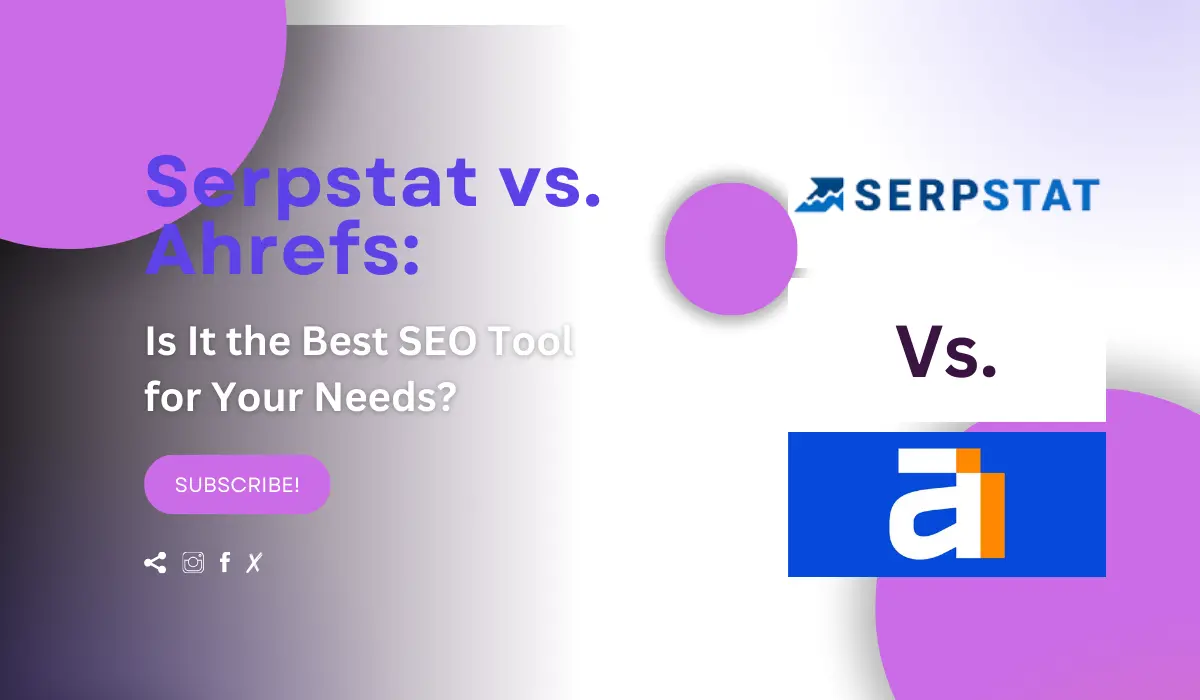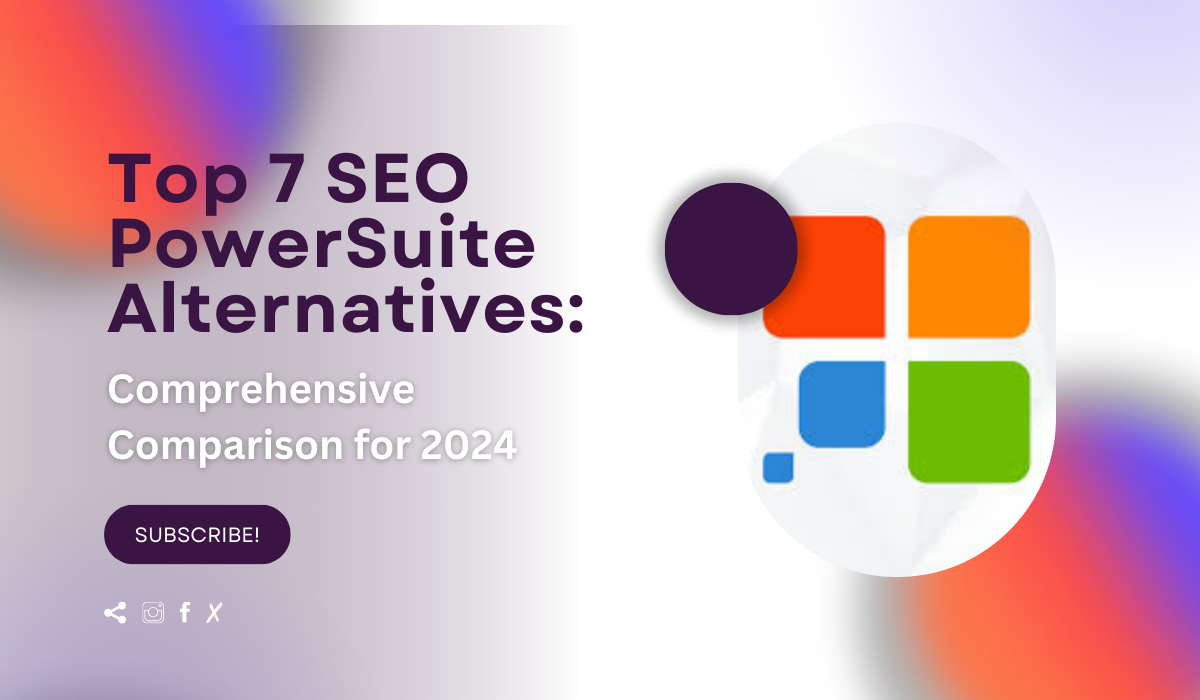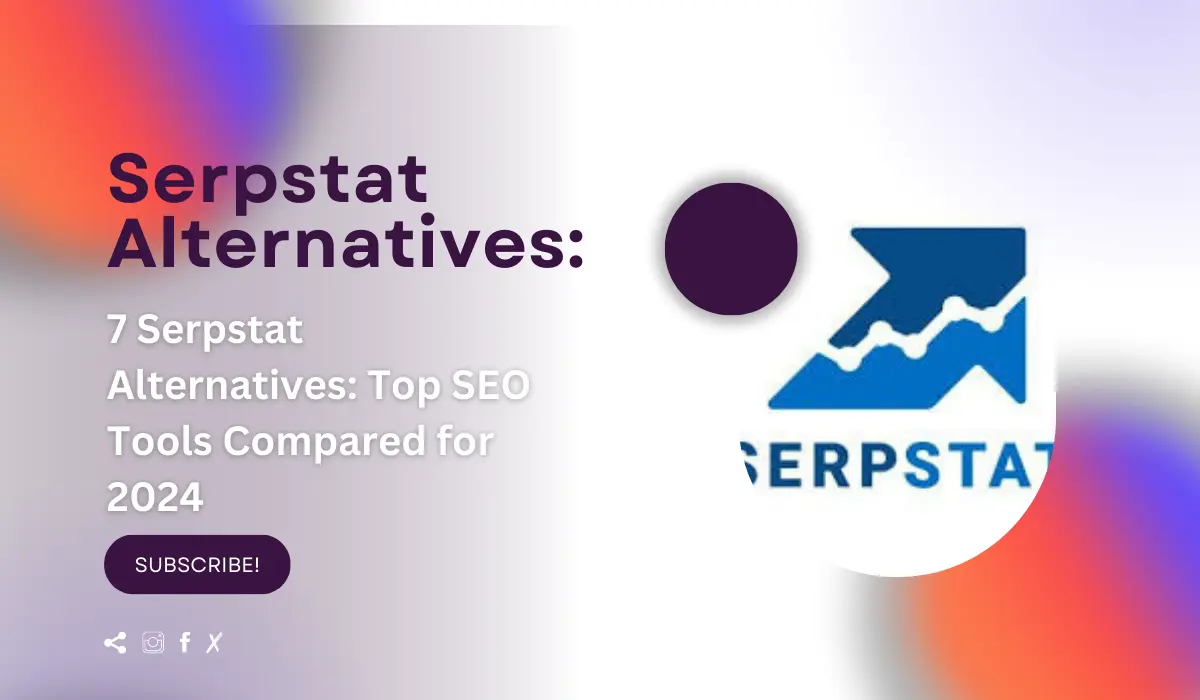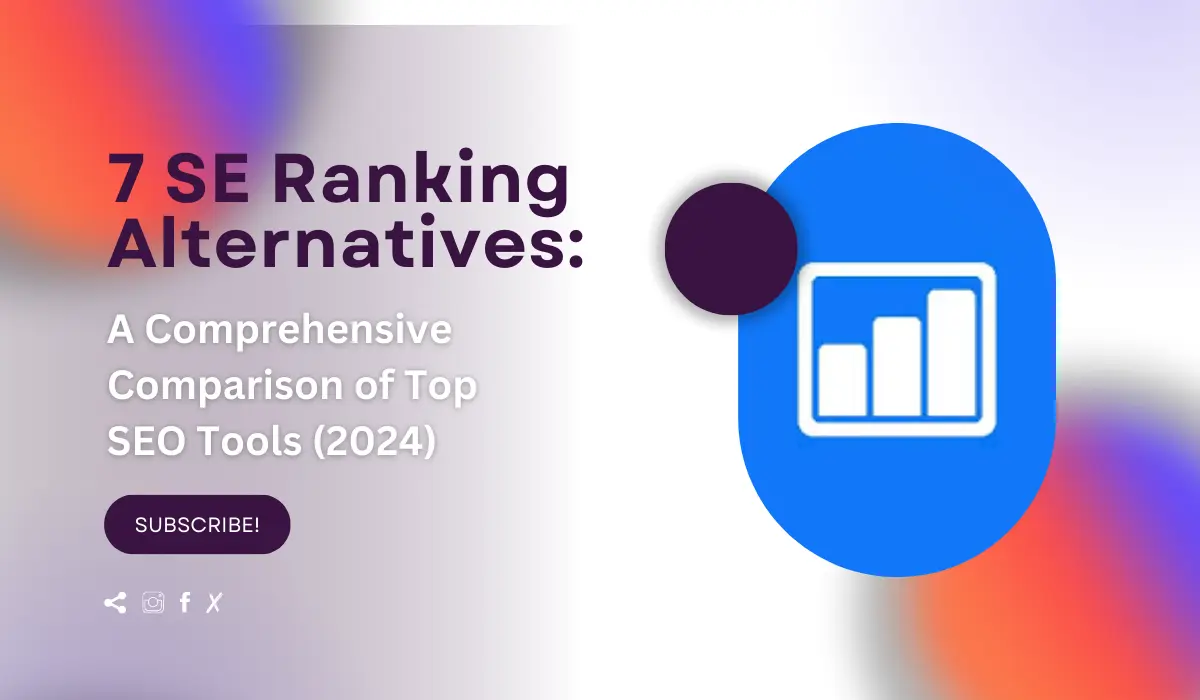1. Introduction to Serpstat vs Ahrefs
Overview of Serpstat:
Serpstat is a powerful all-in-one SEO platform designed to assist marketers and SEO professionals in improving their search engine rankings. Established in 2013 as a keyword research tool, it has since grown into a full-fledged platform that offers keyword research, site audits, competitor analysis, backlink tracking, and more. Its main appeal lies in its affordability, making it accessible to startups, small businesses, and individuals who need effective SEO solutions without breaking the bank.
One of Serpstat’s unique features is its keyword clustering tool, which groups related keywords to help users build better-optimized content strategies. Additionally, its site audit feature enables users to track technical SEO issues, making it a valuable tool for optimizing website performance and adhering to Google’s ever-changing algorithm updates.
Serpstat may not have the same brand recognition as Ahrefs, but it certainly packs a punch in terms of the features it offers, especially when you consider its cost-effective pricing structure.
Overview of Ahrefs:
Ahrefs is a household name in the SEO community and has established itself as one of the most powerful and comprehensive SEO platforms on the market. Founded in 2010, Ahrefs quickly became the go-to platform for SEO professionals looking to conduct in-depth competitor research, backlink analysis, and keyword tracking. One of Ahrefs’ main selling points is its massive backlink database, which is updated regularly to provide users with the most accurate and up-to-date information.
Ahrefs goes beyond traditional SEO tools with its Content Explorer, a feature that allows users to explore top-performing content within their niche, identify content gaps, and generate ideas for new content that will resonate with their audience. Additionally, Ahrefs provides advanced filtering options that let users narrow down keyword research to specific regions, languages, and devices, making it one of the most versatile tools for global SEO campaigns.
The platform has earned its place as an essential tool for large enterprises, digital marketing agencies, and SEO professionals who need robust data and advanced features to compete in a crowded marketplace.
Purpose of This Serpstat vs Ahrefs Review:
In the digital marketing landscape, choosing the right SEO tool can be challenging due to the wide array of options available. Both Serpstat and Ahrefs offer valuable features, but the right tool for you depends on your unique needs, goals, and budget. This in-depth Serpstat vs Ahrefs comparison will cover every aspect of these two platforms, from their strengths and weaknesses to their features, pricing, and real-world applications. Whether you are running a small business or managing SEO for an enterprise, this guide will help you choose the best SEO platform for your objectives.
2. Serpstat vs Ahrefs: Pros and Cons
At-a-Glance Pros and Cons of Serpstat:
Pros:
- Highly affordable with flexible pricing tiers.
- Intuitive and easy-to-use interface for beginners.
- Offers a range of tools for SEO, PPC, and content marketing in one platform.
- Excellent keyword research tools with features like keyword clustering.
- Regular updates and expansion of its feature set.
Cons:
- The backlink database is smaller compared to Ahrefs.
- Data updates and crawls can be slower, especially for backlinks.
- Limited advanced features for professionals and large-scale agencies.
At-a-Glance Pros and Cons of Ahrefs:
Pros:
- Extensive backlink database with one of the fastest data update cycles.
- Powerful competitor analysis tools for SEO and content marketing.
- Detailed keyword research with accurate volume, difficulty scores, and intent analysis.
- Comprehensive site auditing tool with advanced reporting.
- Regular feature updates and high-quality educational content.
Cons:
- High pricing plans, which may not be suitable for freelancers or small businesses.
- Steeper learning curve due to the number of features and options.
- Lacks built-in PPC features for marketers running paid search campaigns.
3. Serpstat vs Ahrefs: Key Features and Services
Comprehensive Keyword Research:
Serpstat’s Keyword Research:
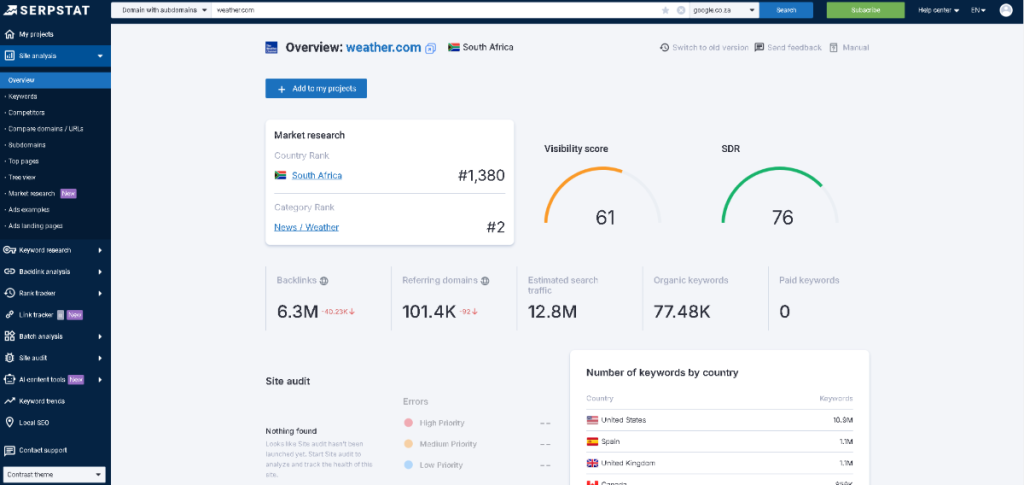
Serpstat’s keyword research tools are among the most popular features of the platform. The tool helps users find related keywords, search volume, keyword difficulty, and keyword trends over time. One of Serpstat’s standout features is its keyword clustering tool, which groups related keywords into clusters, allowing users to optimize their content around keyword groups rather than individual keywords. This feature is particularly useful for content creators looking to target multiple related queries within a single piece of content.
Serpstat also offers suggestions for long-tail keywords, which tend to be less competitive and easier to rank for. These suggestions are valuable for businesses that want to capture niche markets or focus on highly specific queries.
Ahrefs’ Keyword Research:

In contrast, Ahrefs is known for its highly accurate keyword data. Its Keyword Explorer tool allows users to research keywords by analyzing search volume, click-through rates (CTR), and keyword difficulty scores. Ahrefs also provides information on parent topics, allowing users to see how their targeted keyword fits into a broader content strategy. This is invaluable for building comprehensive content that ranks for multiple related terms.
One feature that distinguishes Ahrefs from Serpstat in keyword research is the ability to track “clicks” data, which shows how many users click on search results after typing in a specific keyword. This helps users identify keywords that may have high search volume but low CTR due to features like answer boxes or ads.
Backlink Analysis in Serpstat vs Ahrefs:
Serpstat’s Backlink Analysis:
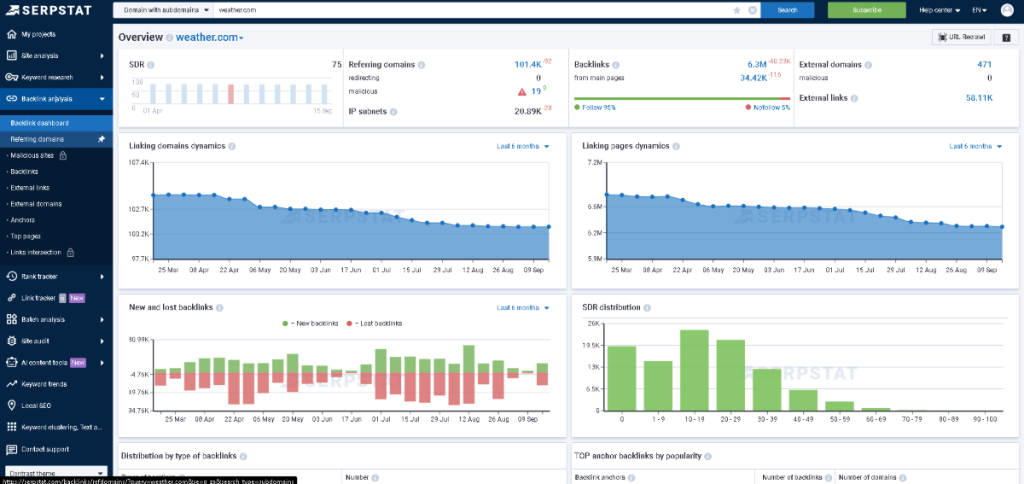
Serpstat provides users with an overview of their backlink profile, including the total number of referring domains, the authority of those domains, and the type of backlinks (dofollow or nofollow). While the data is reliable, Serpstat’s backlink database is smaller than Ahrefs’, meaning users might miss out on some backlinks, especially if they are working with large, competitive websites.
That said, Serpstat is still a valuable tool for backlink analysis for smaller websites and niche markets. Its user-friendly interface allows for quick insights into your backlink profile, helping you track new links and analyze which backlinks are positively impacting your search engine rankings.
Ahrefs’ Backlink Analysis:

Ahrefs is widely regarded as having one of the most comprehensive backlink analysis tools in the SEO industry. With one of the largest and most regularly updated backlink databases, Ahrefs allows users to monitor their own backlinks as well as those of their competitors. Its Site Explorer tool provides a detailed breakdown of referring domains, the strength of backlinks, anchor text, and the overall quality of each backlink.
Ahrefs also allows users to assess the quality of their backlinks through its Domain Rating (DR) and URL Rating (UR) metrics. These metrics give users a clear picture of how authoritative their backlinks are, which can help improve link-building strategies.
Additionally, Ahrefs’ backlink data is updated regularly, meaning you are more likely to get real-time insights compared to Serpstat. Ahrefs also offers historical data, allowing you to track your backlink profile over time and see how changes have impacted your rankings.
Site Auditing:
Serpstat’s Site Audit Tool:
Serpstat offers a user-friendly site audit tool that helps users identify technical SEO issues such as broken links, slow-loading pages, and missing meta tags. The platform provides an overall health score for your website, along with recommendations for improving your site’s performance. The audit reports are easy to understand, making it a good choice for users who are not well-versed in technical SEO.
The tool also includes features like checking the site’s structure, internal linking, and indexing issues, which are essential for maintaining a healthy and SEO-friendly website.
Ahrefs’ Site Audit Tool:
Ahrefs’ site audit tool is more advanced than Serpstat’s and provides a deeper analysis of technical SEO issues. It checks over 100 different on-page and technical SEO factors, including duplicate content, redirect chains, and JavaScript issues that may affect SEO. Users receive a comprehensive report detailing errors, warnings, and recommendations, making it easy to prioritize tasks that will have the most significant impact on site performance.
What sets Ahrefs apart in this area is the level of customization it offers for audits. Users can set their own parameters for what should be flagged as an issue and can track historical data to see how their website’s health score has changed over time.
Rank Tracking:
Serpstat’s Rank Tracking:
Serpstat allows users to monitor their website’s ranking performance for multiple keywords across different regions and search engines. The rank-tracking tool provides daily updates on keyword positions and also tracks changes over time. It’s an excellent tool for keeping an eye on local and global SEO campaigns.
Serpstat also offers a visual representation of keyword rankings, making it easy for users to see which keywords are improving and which are declining.
Ahrefs’ Rank Tracking:
Ahrefs’ rank-tracking tool offers similar features but with added depth. Ahrefs not only provides daily ranking updates but also offers detailed insights into SERP features like featured snippets, local packs, and top stories that may impact rankings. Users can track their rankings across mobile and desktop searches and monitor competitors’ rankings in real-time.
Ahrefs also integrates with Google Search Console, allowing for even more precise data and more comprehensive reporting.
4. Serpstat vs Ahrefs: User Experience
Ease of Use:
Serpstat:
Serpstat is known for its beginner-friendly interface. Even if you’re new to SEO, you can quickly get the hang of using Serpstat thanks to its intuitive dashboard and clear navigation. Each tool is well-organized, and users can easily switch between features like keyword research, backlink analysis, and site audits. The learning curve is relatively short, making it an ideal choice for small businesses, freelancers, and anyone looking for a less overwhelming SEO tool.
The platform also offers extensive educational resources, including blog posts, tutorials, and webinars, to help users get the most out of the tool.
Ahrefs:
Ahrefs, while packed with features, has a steeper learning curve. Its dashboard, while not overly complicated, is dense with data and requires some time to master. The number of features and options can be overwhelming for beginners, but SEO professionals will appreciate the depth of information available.
Ahrefs’ educational resources are top-notch, offering comprehensive guides, tutorials, and blog posts on everything from keyword research to advanced SEO techniques. However, the initial experience can be a bit daunting, especially for users unfamiliar with advanced SEO tools.
Customer Support:
Serpstat:
Serpstat offers responsive customer support through live chat, email, and a dedicated knowledge base. The support team is known for being helpful, especially for users who are new to SEO or require assistance with understanding specific features. The knowledge base contains a wealth of information, including video tutorials, step-by-step guides, and FAQs.
Ahrefs:
Ahrefs also provides excellent customer support via email and a comprehensive knowledge base. However, one area where Ahrefs excels is its community and educational resources. Ahrefs’ YouTube channel, blog, and academy offer in-depth tutorials on almost every aspect of SEO, making it a valuable resource for users who want to enhance their skills.
5. Serpstat Competitor Comparisons
When considering an SEO tool, it’s essential to explore how it stacks up against its competitors. Check out these in-depth comparisons for more insights:
- Semrush vs Serpstat: A detailed comparison of two leading SEO tools, covering their strengths, weaknesses, and which is best suited for specific use cases.
- SE Ranking vs SEMrush: Explore how SE Ranking compares to SEMrush in terms of features, pricing, and overall performance to help you make an informed decision.
- Serpstat vs SEMrush: Serpstat is budget-friendly with strong keyword clustering, while SEMrush offers extensive features for multi-channel campaigns, including content and social media management, ideal for larger strategies.
These comparisons will provide further clarity if you’re deciding between Serpstat and other top SEO platforms.
6. Serpstat vs Ahrefs: Pricing Plans
Serpstat Pricing:
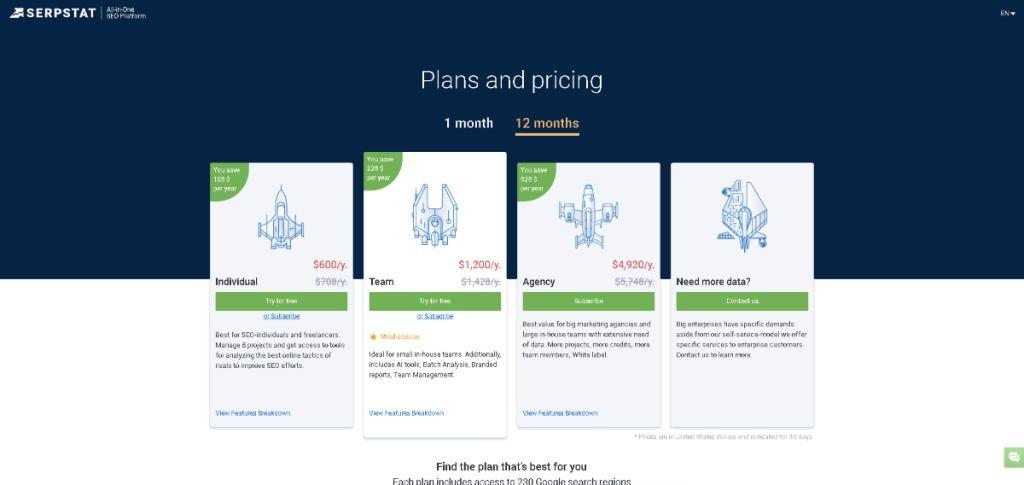
Serpstat is widely recognized for its affordable pricing structure. It offers four main pricing plans:
- Lite: $69 per month, suitable for freelancers and small businesses.
- Standard: $149 per month, ideal for in-house marketing teams and SMBs.
- Advanced: $299 per month, best for larger companies and marketing agencies.
- Enterprise: $499 per month, tailored for large organizations and enterprises.
All plans include access to Serpstat’s keyword research, site audit, rank tracking, and backlink analysis tools, but the higher-tier plans offer increased usage limits and additional features such as API access and extended historical data.
Ahrefs Pricing:

Ahrefs is significantly more expensive than Serpstat, but it offers more advanced features and data accuracy. Ahrefs offers four pricing plans:
- Lite: $99 per month, best for individuals and small businesses with limited SEO needs.
- Standard: $199 per month, suitable for marketing teams and SMBs.
- Advanced: $399 per month, designed for agencies and large companies.
- Enterprise: $999 per month, tailored for large organizations and enterprises that require extensive API access and custom reporting.
While Ahrefs is more costly, its extensive database, detailed reports, and advanced features make it worth the investment for professionals and agencies who need a comprehensive SEO tool.
7. Real-World Applications of Serpstat and Ahrefs
Case Study: How I 7x’d SEO Traffic with ChatGPT and Serpstat
In this case study, a digital marketer used Serpstat in combination with ChatGPT to significantly boost organic traffic by 700%. The strategy revolved around using Serpstat’s keyword clustering and content marketing tools to identify high-potential keywords and content opportunities. By automating content creation with ChatGPT, the user was able to generate SEO-optimized articles at scale, targeting long-tail keywords that had lower competition but significant search volume.
The result? A 7x increase in organic traffic within a few months, demonstrating how Serpstat’s keyword tools can complement AI-generated content to drive results. This case study shows that Serpstat is a powerful tool for those looking to scale content production and improve rankings without overspending on traditional SEO techniques.
Key Takeaways:
- Combined ChatGPT’s AI-generated content with Serpstat’s keyword research tools.
- Focused on long-tail keyword opportunities with low competition.
- Achieved a 700% increase in organic traffic.
Case Study: A Serpstat Success Story
An SEO agency used Serpstat to deliver exceptional traffic growth results for their clients. By leveraging Serpstat’s site audit and competitor analysis tools, the agency was able to identify technical SEO issues, optimize their clients’ websites, and outperform competitors in search rankings. The agency also made use of Serpstat’s rank-tracking feature to monitor improvements and refine their strategy over time.
For one client, the agency achieved a 5x growth in organic traffic within a 6-month period, largely thanks to Serpstat’s comprehensive audit tools and in-depth keyword data. The platform’s affordability also made it an ideal choice for a growing SEO agency that needed to maximize results without inflating costs.
Key Takeaways:
- Used Serpstat’s site audit and rank-tracking tools to optimize client websites.
- Identified gaps in competitors’ strategies and improved keyword targeting.
- Achieved a 5x increase in client traffic within six months.
Case Study: The Power of Content
Zapier, a popular automation tool, utilized Ahrefs to grow its blog traffic by focusing on content-driven SEO. Zapier’s team used Ahrefs’ Content Explorer to identify high-ranking content within their niche and reverse-engineered their strategy. By identifying high-volume keywords and content gaps, Zapier was able to create blog posts that addressed users’ needs while aligning with search intent.
Using Ahrefs’ backlink analysis and keyword research tools, Zapier tracked their performance over time, building a strong backlink profile and optimizing for more competitive keywords. This data-driven approach led to a 4x increase in organic traffic to their blog, demonstrating how Ahrefs can be leveraged to dominate content marketing within competitive niches.
Key Takeaways:
- Used Ahrefs’ Content Explorer and keyword research to identify content gaps.
- Built a strong backlink profile using Ahrefs’ site explorer.
- Achieved a 4x increase in blog traffic by focusing on content-driven SEO.
Case Study: Global Traffic Growth
Wise (formerly TransferWise) used Ahrefs to expand its global SEO strategy. The company aimed to attract international users by optimizing for country-specific search results. With Ahrefs’ international rank tracking and competitor analysis, Wise was able to identify localized search trends and tailor its content to specific regions.
Ahrefs’ Site Explorer allowed Wise to track competitors in different countries and identify opportunities to rank for high-value keywords. By focusing on local SEO and leveraging Ahrefs’ data, Wise achieved impressive growth in organic traffic across multiple regions, solidifying its place in international markets.
Key Takeaways:
- Used Ahrefs’ international rank tracking and competitor analysis tools.
- Optimized content for country-specific keywords to boost global SEO.
- Achieved substantial growth in international traffic and rankings.
8. Conclusion: Which SEO Tool Is Right for You?
When comparing Serpstat and Ahrefs, the choice largely comes down to your budget and the depth of features you need.
- Serpstat is a fantastic option for businesses or individuals looking for an affordable SEO tool that covers the basics like keyword research, backlink analysis, and site audits. Its intuitive interface and lower price make it perfect for beginners or those with limited resources.
- Ahrefs, on the other hand, is a powerhouse for professionals and enterprises that require more advanced tools, larger databases, and frequent updates. If you need detailed insights into your backlinks, competitor analysis, and more comprehensive keyword data, Ahrefs is the clear winner.
Both tools offer free trials, so it’s worth testing them out to see which one aligns better with your needs.
9. Frequently Asked Questions: Serpstat vs Ahrefs
1. Can I use Serpstat for backlink analysis?
Yes, Serpstat has a backlink analysis tool that allows users to monitor their backlink profile. However, its database is not as extensive as Ahrefs, so it may miss some backlinks, especially for larger websites.
2. Is Ahrefs worth the higher cost?
For professionals, agencies, or large enterprises, Ahrefs is worth the cost due to its extensive database, real-time data updates, and advanced features. If you need more than just basic SEO tools, Ahrefs will provide the depth and accuracy necessary to succeed.
3. Which tool is better for keyword research?
Ahrefs offers more accurate and detailed keyword research data, including search volume, keyword difficulty, and click-through rates. However, Serpstat’s keyword clustering feature is highly useful for those focused on content marketing and topic optimization.
4. Does Serpstat offer any unique features?
Yes, Serpstat’s keyword clustering tool is a standout feature that allows users to group related keywords, helping create more optimized and comprehensive content.

